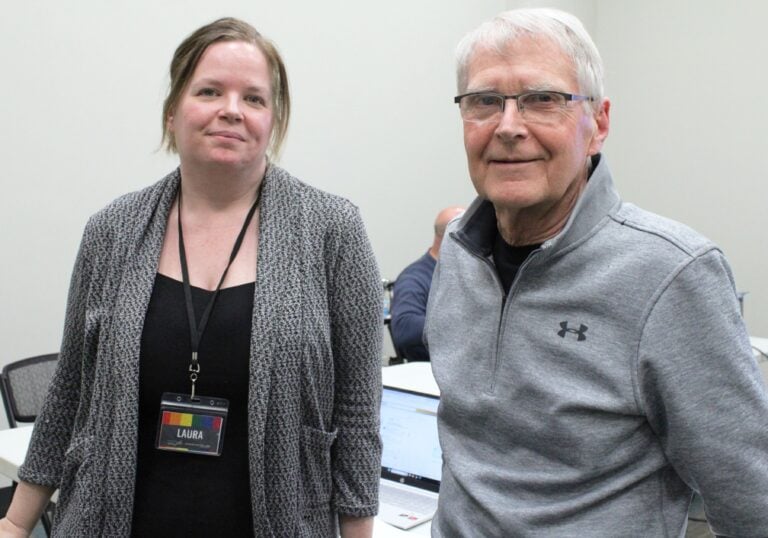This is the second in a series of in-depth stories about how tourism is changing worldwide and how some destinations are dealing with concerns about overtourism, unprecedented growth in short-term rentals, skyrocketing housing prices and, ultimately, how these factors can affect communities.
Arguing for sustainable and efficient tourism does not mean politicians are anti-tourist, the deputy mayor of Venice says.
“Venice is an open and welcoming city, and anyone can visit in the future,” Simone Venturini told The Lake Report.
The Venetian councillor says his city is trying to promote the repopulation of the historic centre while using the pandemic as an opportunity to rethink how the city manages tourist flow, tourist rentals and employment.
It is one of the main points laid out in the decalogo, a document released by the Italian cities of Venice and Florence earlier this year, that seeks to draw attention to the unique problems tourist cities are facing thanks to the growth of the short-term rental market.
“We must aim for quality tourism, attentive, respectful of a city’s fragility, as well as accompanied by a balanced and sustainable economic dimension,” it reads.
Finding this balance means taking a critical approach to the economic ramifications of tourism on particular tourist destinations, such as Niagara-on-the-Lake.
Among the main concerns of short-term rental accommodations are the indirect factors that affect the economy of a town and the resident taxpayers. These are referred to as “externalities” by economists.
“In the case of neighbours on a street with short-term rentals, externalities include noise and stress on neighbourhood infrastructure like trash pick-up,” Josh Bivens, the director of research at the Economic Policy Institute, writes in his 2019 study “The Economic Costs and Benefits of Airbnb.”
“The potential for such externalities has been broadly recognized for a long time and was a consideration leading to the prevalence of zoning laws that ban short-term travel accommodations in residential neighbourhoods.”
Niagara-on-the-Lake Lord Mayor Betty Disero sought to address some of these external pressures when she successfully fought for the implementation of a municipal accommodations tax.
“The local taxpayers of 18,000 cannot continue to carry the burden for tourism infrastructure for upwards of 2,000,000 tourists annually,” Disero’s motion to pass the accommodations tax read.
The proliferation of short-term rentals into residential neighbourhoods is the main cause of these externalities and a reason why traditional hotels can be better for residents, Bivens says.
“These externalities are why hotels are clustered away from residential areas,” he writes.
“There is the strong possibility that (short-term rentals) are indeed posing large costs on neighbours.”
Bivens notes the single greatest cost for residents due to short-term rentals is the increased price of housing, a topic explored in the previous instalment of this series. But he argues the myriad possible externalities, though more difficult to quantify, can be just as important to consider.
As Bivens notes, hotels are clustered away from residential neighbourhoods so they do not bring undue stress on residential infrastructure like plumbing, trash collection and roadways.
In NOTL, there is a further dimension.
The town allows short-term rentals to occur on residential properties whereas Ontario municipalities like Seguin, Oro-Medonte and Wasaga consider the businesses strictly commercial and make it illegal for them to operate on a residentially zoned area.
By retaining their residential zoning, it also means short-term rentals are avoiding paying significantly higher commercial tax in NOTL.
For Bivens, this is one of the main negative economic effects home-sharing short-term rentals have on municipalities.
Not only are short-term rentals causing external financial stress on residential neighbourhoods – unlike hotels – they also don’t pay an equivalent share in helping municipalities maintain neighbourhood infrastructure, Bivens says.
“Many cities impose relatively steep taxes on short-term rental lodging, hoping to obtain revenue from out-of-town travellers to spend on local residents,” he writes.
He argues that short-term rentals are undoubtedly direct competition with local hotels.
NOTL’s planned municipal accommodation tax applies only to properties renting out five or more rooms. That means fewer than five per cent of the town's short-term rentals (just 12 of 255 as of September 2021) will be collecting the levy.
And the more often people choose a short-term rental over a hotel in NOTL, the less revenue the municipality can generate to offset external pressures of tourism.
This is certainly happening all over the world, as the main attraction of short-term rentals versus hotels is lower prices. That is a problem, Bivens says.
“The primary appeal of Airbnb to most travellers is lower-price accommodations, so even if the same tax rate were paid on Airbnb rentals as is paid on hotel rooms, the lower Airbnb prices would lead to less tax revenue accruing to local governments,” he says.
Bivens notes a prevalent argument in favour of short-term rentals is that tourists staying in them benefit the municipality by spending money in shops and restaurants.
But this argument fails “to account for the fact that much of this spending would have been done anyway by travellers staying in hotels or other alternative accommodations,” he writes.
As was noted in the previous instalment of this series, only two to four per cent of 800 guests who use Airbnb said they would not have stayed in a hotel if Airbnb was not available.
Quality of employment in a tourist town can also be affected by short-term rentals out-competing traditional hotels.
Bivens writes that third-party cleaning services are less likely to offer good wages for their employees.
A 2017 study by German economists Deborah Goldschmidt & Johannes F. Schmieder found that when hotels outsourced their labour to third-party sources there were “large negative wage effects.”
Short-term rentals generally rely on third-party cleaners or they do not hire cleaners at all, Bivens notes.
Oro-Medonte Mayor Harry Hughes noted external pressures on municipalities can also include increased staff hours to regulate short-term rentals, handle licensing and deal with bylaw-related matters.
Since Oro-Medonte is charged by police on a “call for service” basis, he said his town loses more money dealing with disrespectful tourists when the police have to get involved – such as renters having fires when it is against the law.
As short-term rentals eat up available living space for long-term residents they can also remove the long-term benefits of having people work where they live.
As was noted in part 1 of this series, short-term rentals can have a direct effect on increasing home and rental costs wherever they appear.
This can be seen as a good thing for residents who already live in an area. Their home's value is increasing thanks to the growth of short-term rentals.
But in increasing housing and rental prices and moving valuable long-term living space into the short-term rental market, there are concerns about communities being hollowed out because new residents cannot move in. Bivens refers to this problem as the conversion of long-term housing to the short-term rental market.
“In the lagoon city there is an evident imbalance between the number of visitors and the number of inhabitants,” Venice’s and Florence’s decalogo reads.
“We ask that not only the immense artistic heritage (of Venice and Florence) be preserved, but also the city life that gives soul to stones and paintings.”
The decalogo notes that as residents are pushed out of the city, their valuable commercial activities which “embody the wealth and tradition” of the city are continuously replaced by “worthless junk shops.”
Venice is also working with Italy's federal government to create new legislation to entice long-term residents to the historic city and rectify the imbalance between tourists and residents, Venturini said.
One of these ways is enacting legislation that helps young, first-time home owners looking for residences in the city centre, he said.
Venice has also launched programs that encourage students to live long-term in the city and therefore “enrich the local community with their skills.”
He said Venice is asking the government for “special powers for a special city” to manage the flow of tourists into the city and to help “encourage cultural, experiential and quality tourism and longer stays of guests.”
The hollowing out of communities also exacerbates negative externalities, Bivens writes.
“Long-term renters really do have some incentive to care about the neighbourhood’s long-run comity and infrastructure, whereas short-term renters may have little to no such incentive,” he says.
“That’s exactly the problem,” Hughes told The Lake Report.
Oro-Medonte has had issues with short-term rental clients disrespecting the town’s waterfront, fire regulations and noise bylaws, he said.
“In a normal hotel you have management there to control the guests. In these situations you do not,” he said.
Hughes said there is a concern in his town that the entire waterfront property of Oro-Medonte, some 18 kilometres of shoreline along Lake Simcoe, could all be converted to short-term rentals.
In Seguin, this has become a very real problem.
Mayor Ann MacDiarmid said the hollowing out of Seguin’s community is her main gripe with short-term rentals.
“I bought my lakeside home to be part of a neighbourhood and I want to know my neighbours,” she said.
“And I want them to care for the lake as much as I do. To care for my neighbours, my lake, my forest and everything else.”
On some lakes in the municipality, more than 50 per cent of the cottages are being used as short-term rentals, she said. And that is hurting “the enjoyment (of long-term residents).”
“We’ve got to try and protect, as the township, protect what people bought and the lifestyle they wanted, which is tranquillity, access to the lake, cleanliness, peace," MacDiarmid said.
"You know, everybody has the odd party, but if it’s a party every night next door, that’s not what people want.”
She said the township routinely deals with short-term renters who abuse the environment, the property, practise unsafe boating, have illegal fires and break noise bylaws.
“The people that misbehave with noise or fire regulations tend to be renting for three or four days and tend to be putting way too many people into the allowable space,” she said.
MacDiarmid said she is not anti-tourist and believes the township can find a happy medium with tourism.
But, at this point, “I don’t know what that could look like,” she said.
She noted some Florida communities mandate rentals cannot be less than a month, thus prohibiting what Venturini referred to as “hit-and-run” tourists.
MacDiarmid also said renters who have been renting the same cottage for many years from close friends can be seen as part of the community, with incentive to respect the area.
She said the township has prosecuted people who own five or six cottages that solely are used for short-term rentals.
In their 2017 study “The Effects of Home Sharing on Housing Prices and Rents,” economists Kyle Barron, Edward Kung and Davide Proserpio write “recent research suggests that the sharing economy is increasing societal inequality and financial hardship, and lowering city liveability.”
Municipalities should “seek to limit the reallocation of housing stock from long-term rentals to short-term rentals without discouraging the use of home-sharing by owner-occupiers.”
As the growth of short-term rentals is a seeming inevitability, a balanced approach to managing them, distinct to each municipality, seems essential.
Next: A look at what approaches some municipalities and planning lawyers are taking to ensure a balance between long-term residents and short-term rentals.



.jpg)







